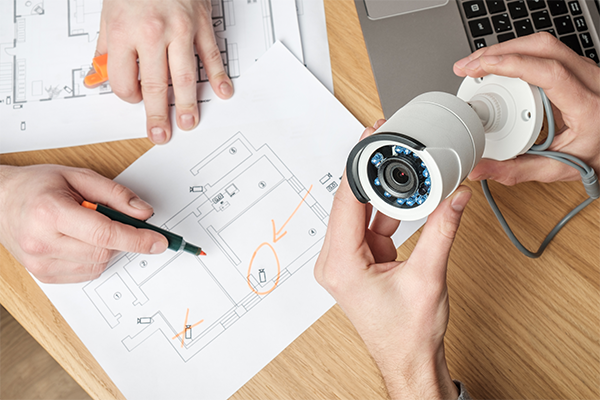Motion Detector Installation Basics
Motion detection devices are a crucial component of any security system, commercial or residential. They allow owners to cover a relatively large amount of space with a small number of devices. Motion detectors also are known to detect activity that window sensors might miss. When it comes time to install motion detection devices, remember these tips to stay ahead of any potential intruders.
How motion detectors work
Motion detectors use various methods to detect motion and protect your environment. A few popular commercial and residential security systems options include passive infrared, microwave, and dual sensors.
A passive infrared sensor (PIR) collects infrared light and ambient temperature to detect motion. A microwave sensor actively uses microwaves to determine the room’s reflection rate and alert you when that rate changes. Dual sensors use a combination of PIR and microwave technology to verify potential motion between the two systems before issuing an alert. These are only a few types of motion detectors, so you have many other effective options to implement in your security system.
Efficiency
One of the main strengths of motion detection devices is their ability to cover maximum square footage efficiently. Remember to focus on high-traffic areas or central locations when installing motion detectors in your house or business. Areas like hallways and staircases should have ample coverage to catch intruders as they move from room to room. Be sure to also have plenty of coverage in rooms with big-ticket items like TVs, gaming consoles, and other personal valuables.
Room coverage
When choosing the perfect location for your motion detector, pick a spot that covers your room the most effectively and efficiently. Our rule of thumb is to place the motion detector in the corner of the room facing the entrance. This location focuses the sensor on the potential action area and helps reduce or eliminate spots out of range.
Ideally, a motion detector would be mounted around six to eight feet above the ground. This height allows for it to be triggered by anyone walking in range. Remember that different motion detectors have varying range specifications, so make sure to review your detector’s specifications.
Avoiding false alarms
While a “false alarm” is perceived as bad, it often means your security system is working too well and being triggered outside of an emergency. This issue can often be alleviated by recalibrating the system or rethinking sensor placement.
Many motion detectors rely on heat-sensing technology to trip their alarm. Pets, bursts of sunlight, and curtains or plants blowing from fans can be enough to activate a motion detector. Keep that in mind when determining the perfect location for your device. For customers seeking additional solutions for environments with animals, pet-immune motion detectors are available in various makes and models. Some models support highly personalized settings, so we recommend thoroughly researching your options.
Mapping out the ideal setup for your motion detection devices will help them protect your home or business at peak performance. On the other hand, haphazardly installing them can lead to debilitating performance issues and frequent false alarms. By partnering with FSS Technologies, our customers entrust their property to a group of certified security professionals while also receiving the personalized services of a small, family-owned business.










